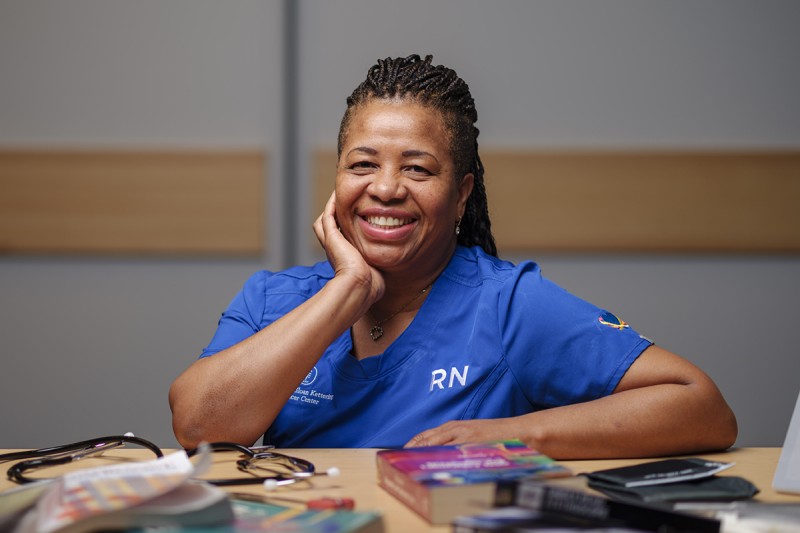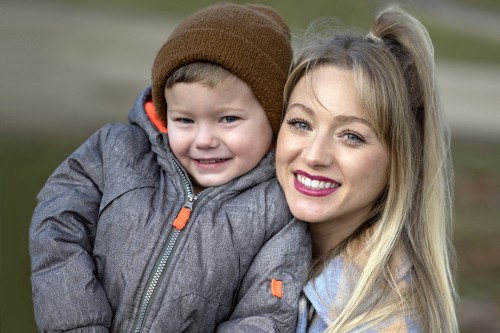
MSK nurses and advanced practice providers offer not only compassionate care but also problem-solving skills that push the field forward. Meet three winners of the Robbins Family Awards for Nursing Excellence below.
Jennifer Ogilvie, MSN, RN, NE-BC, Clinical Supervisor
Excellence in Humanitarian Efforts
After seeing dramatic disparities between the U.S. and Jamaica, Jennifer organized donations of medical supplies to benefit nursing students abroad.
I was born in Jamaica. Jamaican people are some of the warmest and kindest people. But the country does not have as many resources as the United States.
After I came to MSK, I started going on visits and medical missions back home. Every time, something tugged at my heart. I thought, “There must be something I can do to help the practitioners care for their patients when we are not there.” I discovered that nursing students there didn’t have basic equipment, like blood pressure cuffs, stethoscopes, or blood glucose machines. The costs can be prohibitive. One U.S. dollar is 150 Jamaican dollars, so a $150 stethoscope here could cost as much as $15,000 in Jamaican money.
I reached out to some of my nursing friends, saying, “Hey, do you want to donate this stethoscope, or a textbook, or some bandages?” My colleagues are a special breed. They always want to do something to help somebody else. I made an Amazon registry of needed items. When people bought them, they were shipped to my home, and then I shipped them to Jamaica.
I’ve done two donations so far, about 400 items in total. Next, I am doing one just for nursing textbooks. We also send tablets. So many people here have tablets that their kids don’t use anymore. You’d be surprised how many people these can help.
I’ve gone back to meet some of the students and faculty who had received the supplies. They were so grateful, they wanted to repay us. They brought us mangoes, pineapples — whatever they could. For people who don’t have much and still find something to share, that, to me, says it all. I was thrilled to meet them and so thankful to those who are always willing to give to others.
“My colleagues are a special breed. They always want to do something to help somebody else.”
Tom Bracken, MA, RN, OCN, Clinical Nurse IV
Excellence in Clinical Nursing Leadership
After more than a decade owning a landscaping business, Tom became a nurse, bringing his leadership skills to educational programs for neurology nurses.

I never had dreams of becoming a nurse. I went to school for forestry. That led me to develop my own landscaping business, which I had for 15 years. But I was looking for a meaningful change.
My wife and I have friends who were nurses, and I saw how they loved their jobs. I also had a personal experience. In my 20s, my appendix burst, and I was in the hospital for two weeks. The best nurse I had was a male nurse. That made me see that it wasn’t just a female profession. I decided I wanted to do what he did.
Coming in as a second-career nurse, I was intimidated by a lot of things. I want to help new nurses because I know what it’s like. There are intricacies of our unit that I can teach. With help from my colleagues, I retooled our unit’s orientation and developed an advanced training program for nurses about to start in our Neuro Advanced Care Unit (NACU). I want to build their confidence. The nursing care at MSK is phenomenal, and I want to help maintain that.
In both of my careers, the emphasis has been on taking care of others: “What do I need to do to make this person happy? What’s the problem, and how do we fix it?”
Melissa Zimmermann, MS, BSN, RN-BC, Nursing Informatics Specialist
Excellence in Innovation
Melissa’s expertise in both nursing and computer science enabled her to help create an automated alert system for urgent lab results, streamlining communication so clinicians can focus on their patients.

Nursing informatics is the intersection between clinical practice and information technology. Having a fundamental understanding of what nurses do day-to-day has really served me in helping communicate the needs from the technical side to nursing, and vice versa.
The past few years, our team at MSK helped automate a process that saves time for both the lab and clinicians. When someone gets blood work and the results come back “critical” — for example, a patient’s potassium is low and needs replacement — the provider needs to be notified within a short window. It used to be a multistep process requiring phone calls. Now it’s just an automated alert message to the provider on service that day.
Having efficient systems is so important. It gives patients confidence in their care. And it frees us to spend time with people when they need us the most.
Click here to learn about the other honorees.



